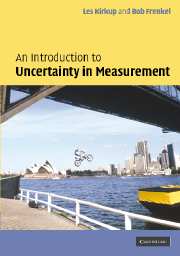 An Introduction to Uncertainty in Measurement
An Introduction to Uncertainty in Measurement Book contents
- Frontmatter
- Contents
- Dedication
- Preface
- 1 The importance of uncertainty in science and technology
- 2 Measurement fundamentals
- 3 Terms used in measurement
- 4 Introduction to uncertainty in measurement
- 5 Some statistical concepts
- 6 Systematic errors
- 7 Calculation of uncertainties
- 8 Probability density, the Gaussian distribution and central limit theorem
- 9 Sampling a Gaussian distribution
- 10 The t-distribution and Welch–Satterthwaite formula
- 11 Case studies in measurement uncertainty
- Appendix A Solutions to exercises
- Appendix B 95% Coverage factors, k as a function of the number of degrees of freedom, v
- Appendix C Further discussion following from the Welch–Satterthwaite formula
- References
- Index
6 - Systematic errors
Published online by Cambridge University Press: 06 July 2010
- Frontmatter
- Contents
- Dedication
- Preface
- 1 The importance of uncertainty in science and technology
- 2 Measurement fundamentals
- 3 Terms used in measurement
- 4 Introduction to uncertainty in measurement
- 5 Some statistical concepts
- 6 Systematic errors
- 7 Calculation of uncertainties
- 8 Probability density, the Gaussian distribution and central limit theorem
- 9 Sampling a Gaussian distribution
- 10 The t-distribution and Welch–Satterthwaite formula
- 11 Case studies in measurement uncertainty
- Appendix A Solutions to exercises
- Appendix B 95% Coverage factors, k as a function of the number of degrees of freedom, v
- Appendix C Further discussion following from the Welch–Satterthwaite formula
- References
- Index
Summary
A systematic error causes a measured value to be consistently greater or less than the true value. The amount by which the value differs from the true value may be a constant. Such a situation would occur, for example, when using a micrometer that has a ‘zero error’: the scale of the micrometer indicating a non-zero value when the jaws of the micrometer are closed. In other circumstances, a systematic error may be proportional to the magnitude of the quantity being measured. For example, if a wooden metre rule has expanded along its whole length as a consequence of absorbing moisture, the size of the systematic error is not constant but increases with the size of the object being measured.
Systematic errors may be revealed in two ways: by means of specific information or when the experimental set-up is changed (whether intentionally in order to identify systematic errors, or for some other reason). In both cases we need a good understanding of the science underlying the measurement. In general, statistical analysis may or may not be involved in assessing the uncertainty associated with a systematic error, so this uncertainty may be Type A or B. When the effect of random errors has been minimised, for example by taking the mean of many values, the influence of systematic errors remains unless they too have been identified and corrected for.
Since a systematic error does not necessarily cause measured values to vary, it often remains hidden (and may be larger than the random errors). Experienced experimenters consistently review their methods in an effort to identify and quantify systematic errors.
- Type
- Chapter
- Information
- An Introduction to Uncertainty in MeasurementUsing the GUM (Guide to the Expression of Uncertainty in Measurement), pp. 83 - 96Publisher: Cambridge University PressPrint publication year: 2006
- 1
- Cited by


